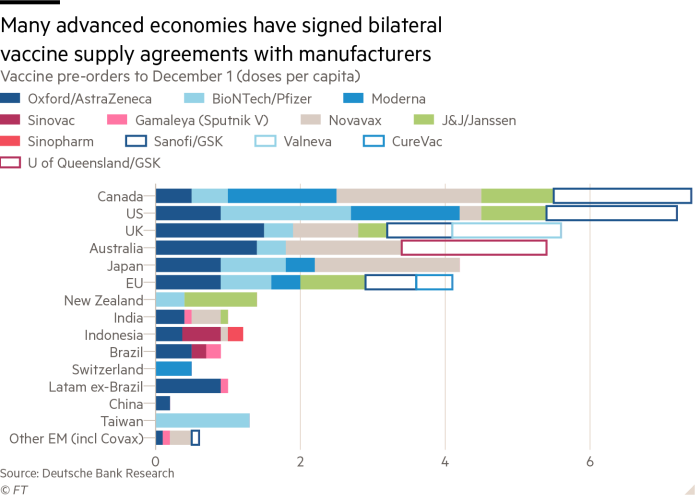
Asia plays the long game on Covid vaccine rollout
Asia has led the world in controlling the spread of Covid-19, but that very success has set the region behind the US and Europe in the race to vaccinate against the disease.
In countries with limited coronavirus outbreaks, regulators have been happy to let westerners act as guinea pigs for hastily approved jabs, while in others, the low level of Covid-19 cases means that locally developed vaccines have struggled to complete clinical trials.
Asia’s vaccine caution contrasts with fervent enthusiasm in the US and Europe, where coronavirus infection is raging and authorities have made it a point of pride to grant approvals quickly.
The differing approaches raise the prospect of a world where some nations are vaccinated and others are not, which could affect the speed of economic recovery and hinder international travel.
In countries such as South Korea, Vietnam and Australia, controlled outbreaks make vaccination a choice rather than a necessity.
“We are coping with Covid-19 relatively well so we don’t have to begin vaccination in a hurry when the risks have not been verified yet,” said Park Neung-hoo, South Korean health minister.
Seoul has signed deals for 20m doses each from AstraZeneca, Pfizer and Moderna, plus another 4m doses from Johnson & Johnson. Although inoculations could start in the first half of next year, South Korean health experts said widespread vaccinations were unlikely until next autumn, because the country has to go through its own safety checks.
“We had better secure the volume [of jabs] in advance, but begin vaccinations [only] after monitoring any possible side effects from inoculations abroad for two to three months,” said Mr Park.
Australia and Vietnam are in a similar position, with only a handful of Covid-19 cases a day. Regulators said they were happy to wait for more safety data.
“Frankly, the work done in the UK will give Australia and the world very important data, very important lessons, both on the rollout and the efficacy of this particular vaccine, but vaccines more generally,” said Greg Hunt, Australia’s health minister.
Canberra has signed deals for four separate vaccines, including the Pfizer/BioNTech jab, with enough doses to cover its population thrice over. But Mr Hunt said vaccinations would only begin in March if the national regulator deemed them safe and effective.
Even if they wanted to start inoculations sooner, countries cannot do so until they have a supply of vaccines. One paradox of Asia’s success in controlling the pandemic has been that not enough people have fallen ill to prove that local vaccines work.
In Japan and South Korea, vaccine candidates have yet to start phase 3 trials and are unlikely to be ready before 2022. Chinese vaccines were among the first to enter clinical trials but fell behind over the summer as they entered the final stage of testing.

Large-scale phase 3 trials require the jabs to be administered in a population where the virus is still spreading, so China’s early effort to eradicate the virus within its borders made trials of sufficient scale near impossible.
Instead, Chinese developers brokered deals to carry out trials in more than a dozen host countries — including Brazil, Indonesia, Pakistan and Russia — often in exchange for promises of early access to vaccines once they were ready.
The delays mean that Chinese vaccines have not yet reached the threshold for regulatory approval. Last week, the United Arab Emirates moved closer to approving a vaccine developed by Sinopharm after interim analysis showed 86 per cent efficacy against infection, a breakthrough for the largest Chinese coronavirus vaccine manufacturer.
Jerome Kim, director-general of the International Vaccine Institute, a Seoul-based multilateral organisation, said the UAE announcement was encouraging but raised questions about the underlying data.
“It’s going to be really important for [Chinese vaccine developers] to make data public,” he said.
Beijing-based Sinovac has also begun exporting its vaccines and delivered 1.2m doses to Indonesia last week, with another 1.8m expected in January.
Indonesia falls into a separate category of poorer but highly populous Asian countries, which also includes India and the Philippines, where Covid-19 is prevalent. There, the challenge is to procure a vaccine and distribute it.
Indonesia has secured 155.5m doses of Covid-19 vaccines: 125.5m from Sinovac and 30m from US company Novavax. Jakarta is in talks to procure an additional 116m doses from Pfizer, AstraZeneca and the World Health Organization’s Covax programme.
Indonesian state-owned pharmaceutical company Bio Farma is conducting phase 3 clinical trials on the Sinovac jab in the city of Bandung. Bio Farma said it would submit an interim report on the clinical trials to authorities in January.
Apart from obtaining a sufficient supply of vaccine doses, Indonesia will also face significant distribution hurdles. The country spills across thousands of islands with often poor transport and infrastructure beyond urban centres.
“The government thinks the vaccine is the quick solution,” said Pandu Riono, epidemiology professor at the University of Indonesia. “But the vaccine itself doesn’t work if you don’t successfully deliver it to the people, and [that is] a complex job.”
Vaccinating just half of Indonesia’s population might take three to four years, he added.
Mr Pandu said Indonesia’s temperature-controlled supply chains were “not perfect” even in more developed provinces, and might struggle to accommodate the vaccines’ various temperature requirements.
Winning Indonesians’ trust to take Covid-19 vaccines could provide an additional challenge, Mr Pandu added, after the government’s poor job at containing the disease.
While Asian countries have moved slowly on vaccines, they may find their citizens demanding inoculations so as to make a full return to travel and normal life.
Reporting by Robin Harding in Tokyo, Song Jung-a in Seoul, Christian Shepherd in Beijing, Jamie Smyth in Sydney, Stefania Palma in Singapore and John Reed in Bangkok
Latest coronavirus news

Follow FT's live coverage and analysis of the global pandemic and the rapidly evolving economic crisis here.


